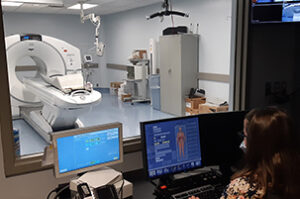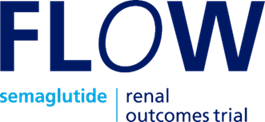
Production of 18F-Fluorodeoxyglucose, commonly referred to as FDG, began at the Nuclear and Molecular Medicine facility in November 2020. The product FDG is used in Positron Emission Tomography, commonly known as PET scans, and it is currently being produced under Health Canada clinical trial.
For more information visit medical imaging.

Purpose of study
To see if Semaglutide can reduce the worsening or progression of kidney disease in people with type 2 diabetes
The FLOW study is being carried out to see if semaglutide can reduce the worsening or progression of kidney disease in people with type 2 diabetes. A previous study has shown that using semaglutide reduced the progression of kidney disease and the risk of cardiovascular events in some people with type 2 diabetes. Semaglutide is already approved in some countries to treat type 2 diabetes.
Project duration
3-5 years
What are the benefits of taking part in FLOW?

There are several potential benefits in taking part in FLOW, for example:
- Take a more active role in your own healthcare
- Get regular expert medical care at healthcare facilities
- Have additional tasks with the study staff to discuss healthy lifestyle choices
- Receive the trial medication for free
- Help others by contributing to medical research
What are the potential drawbacks?
There may be some potential drawbacks to taking part in FLOW:
- You may experience side effects. The most common side effects of semaglutide are nausea, diarrhea, and vomiting
- Your study medicine may prove to be ineffective against kidney problems
- The study may require more of your time and attention than normal treatment, and may include extra clinic visits or more complex treatment requirements
You may be reimbursed for travel expenses associated with taking part in this study. As well, you may be supplied with ancillary products while in the study such as a glucometer and testing strips.
Scope of Project
What will be required if I take part?
Initially, you will go through a screening process to ensure that you meet the criteria or rules for being included in the FLOW study. If you do, your doctor will explain exactly what is expected of a study participant so you can make an informed decision. Participation in the FLOW study will include:
- A once-weekly injection of the study medicine, prescribed by the study doctor
- Attending regular study visits for study related health checks
- Regular contact with the study nurse or doctor throughout the study
Will I know if I have placebo or the real medicine?
FLOW is a ‘placebo-controlled’ study, which means half of the people in the study will be given a ‘dummy’ medicine called a placebo.
- You will be randomly assigned to either the study medicine (semaglutide) or the placebo for the full length of the study.
- You will not know which medicine you have and neither will your study doctor or the study team. At the end of the study, you will be told which medicine you were given. You will also have an opportunity to see the results of the study.
How do my personal study results contribute to the final study results?
The information collected from you during the study is made anonymous, and entered into a database together with information from everyone else in the study. This is then analysed by doctors and scientists. In order for the results to be meaningful, it is very important that everybody in the study continues until the end.
Do I need to attend every study visit?
The FLOW study will last for approximately 5 years in order to get a clear picture of the effect of the study medicine over time. Attending regular study visits help us to understand the effect of the medicine, as well as giving you the opportunity to discuss any health related questions or concerns with your study doctor.
You will be able to discuss the visits with your study doctor and organise times that work best with your schedule. You may also be able to phone the site for some visits, rather than attending in person
Should I still go to my clinic visits if I stop taking the study medicine?
Even if you or your study doctor make the decision to stop taking the study medicine ahead of schedule, it is still very important for you to attend as many visits as possible until the end of the study! Valuable information can still be collected, and the study doctors can monitor your progress and health. Every patient’s information is important for the overall success of the study.
Will being in the FLOW study affect my other medicines?
You will continue to take any other prescribed medicines throughout the study as required.
What should I do if I become pregnant during the study?
You should not take part in this study if you are pregnant, breastfeeding, or planning to get pregnant. If you become pregnant during the study, you should stop taking your study medicine immediately and tell the study staff.
Will I get paid?
You will not receive any compensation for time spent at the clinic or for taking part in the study. You may be reimbursed for travel expenses. Please speak to the study staff about reimbursement.
How will my participation in FLOW benefit others?
Choosing to take part in a clinical study is an important decision. By attending your study visits, you will help us to understand how safe the study medicine is, and how well it works. The results from this study will inform treatment for other people with kidney disease and type 2 diabetes
Additional information
This study is run by Dr. Christopher Kovacs via Laura Genge, Research Coordinator. The number to the patient research center is: 709-777-6996.
If you have any questions, about your rights as a research participant, please contact HREA Ethics Office at 709-777-6974 or email: info@hrea.ca
This study is being sponsored by Novo Nordisk, a global healthcare company with more than 95 years of innovation and leadership in diabetes care.

We are currently participating in a number of clinical trial studies, in the following areas:
Cardiology
SyncAV Post-Market Trial (SyncAV)
The purpose of this study is to evaluate changes in heart size for patients with heart failure, between baseline and 12 months, in patients with Abbott’s cardiac resynchronization therapy CRT device with SyncAV feature compared to patients with standard CRT device settings. This research is being done to see what effects Abbott’s CRT device has in the treatment of heart failure compared to the standard CRT device. We want to see which treatment/therapy is better.
The purpose of this clinical investigation is to assess the impact of the Multi Point Pacing (MPP) feature at 12 months in the treatment of patients not responding to standard Cardiac Resynchronization Therapy (CRT) after six months.
This is a phase III, multi-centre, double-blind, randomized, placebo-controlled, parallel-group study to evaluate the efficacy and safety of CSL112 on reducing the risk of major adverse CV events [MACE – cardiovascular (CV) death, myocardial infarction (MI), and stroke] in subjects with acute coronary syndrome (ACS) diagnosed with either ST-segment elevation myocardial infarction (STEMI) or non-ST-segment elevation myocardial infarction (NSTEMI), including those managed with percutaneous coronary intervention (PCI) or medically managed.
The primary objective of this study is to determine the efficacy and safety of iron therapy using intravenous (IV) ferric carboxymaltose (FCM), relative to placebo, in the treatment of participants in heart failure with iron deficiency and with a reduced ejection fraction.
The purpose of the Confirm Rx SMART Registry is to collect real world data to assess the safety and performance of the Confirm Rx Insertable Cardiac Monitor (ICM) and system over a 12 month period. A sub-set of subjects enrolled in the Confirm Rx SMART Registry will meet the Post Market Clinical Follow-Up (PMCF) requirement for CE mark.
An international, multi-centre, Parallel-group, randomized, double-blind, placebo-controlled, phase III study evaluating the effect of Dapagliflozin on exercise capacity in Heart Failure Patients with Preserved Ejection Fraction (HFpEF)
The primary objective of the study is to determine whether pemafibrate administered twice daily will delay the time to first occurrence of any component of the clinical composite endpoint of:
- nonfatal Myocardial Infarction (MI)
- nonfatal ischemic stroke
- hospitalization for unstable angina requiring unplanned coronary revascularization; or
- Cardio Vascular (CV) death.
Prospective randomized controlled trial comparing low dose Prednisone/Methotrexate combination to standard dose Prednisone in patients diagnosed with acute active clinically manifest cardiac sarcoidosis and not yet treated.
This is a pilot study to assess barriers, evaluate and implement a patient oriented CIED management model incorporating advanced technological innovation to promote a paradigm shift to patient-centered care involving remote CIED monitoring and programming.
Endocrinology
The researchers are doing this study to see if semaglutide can slow down the growth and worsening of chronic kidney disease in people with type two diabetes.
Genetics
cfDNA in Hereditary And High-Risk Malignancies (CHARM)
The goal of this study is to develop an effective, sensitive blood test that can detect early tumours in patients with known or suspected hereditary cancer syndromes (HCS). If this new blood test is accurate, it could be used to screen patients for cancer and allow for earlier cancer detection.
The study will also use questionnaires and interviews to understand how patients feel about incorporating these tests into routine medical care, and the perceptions of the medical value of test results.
The Canadian Fabry Disease Initiative National Registry (CFDI-NR) is an observational, voluntary registry designed to collect outcomes data on Fabry disease from people living in Canada.
The Fabry Registry is an ongoing, international multi-center, strictly observational program that tracks the routine clinical outcomes for patients with Fabry disease, irrespective of treatment status.
Infectious Disease
CanTreatCOVID
CanTreatCOVID is publicly funded research studying medications to see if they can help people with COVID-19 feel better faster, stay out of the hospital, and prevent long COVID.
PERC Health Canada COVID-19
A Multi-Center Evaluation of Buccal Swabs with the Abbott ID NOWTM COVID-19 for Point-of-Care Detection SARS-CoV-2 in Pediatric Emergency Departments.
The SNAP Trial:
SNAP aims to improve treatment outcomes for patients with Staphylococcus aureus bloodstream infections.
Oncology/Hematology
Brentuximab Vedotin or Placebo in Combination With Lenalidomide and Rituximab in Subjects with Relapsed or Refractory Diffuse Large B-cell Lymphoma (DLBCL)
This trial is for patients with diffuse large B-cell lymphoma (DLBCL) that has come back or did not get better with their last treatment. Brentuximab vedotin is a type of drug called an antibody drug conjugate or ADC. This research is being done to find out whether it is better to receive brentuximab vedotin or better to receive no additional intervention. To do this, some of the participants in this study will get lenalidomide and rituximab plus brentuximab vedotin and others will receive lenalidomide and rituximab plus a placebo (a substance that looks like the study drug but does not have any active ingredients).
A Phase 4, single-arm, open-label clinical study of pembrolizumab (MK-3475) to evaluate the efficacy and safety of MK-3475 plus carboplatin and paclitaxel as first-line treatment of recurrent/metastatic head and neck squamous cell carcinoma (KEYNOTE-B10).
The goal of this study is to evaluate the efficacy and safety of pembrolizumab combined with carboplatin and paclitaxel as first line treatment in participants with recurrent/metastatic head and neck squamous cell carcinoma (R/M HNSCC). No statistical hypothesis will be tested in this study.
A Randomized Phase III Trial of MRI Surveillance with or without Prophylactic Cranial Irradiation (PCI) in Small-Cell Lung Cancer
This phase III trial studies magnetic resonance imaging (MRI) surveillance and prophylactic cranial irradiation (PCI) to see how well they work compared to MRI surveillance alone in treating patients with small cell lung cancer. MRI scans are used to monitor the possible spread of the cancer with an MRI machine over time. PCI is radiation therapy that is delivered to the brain in hopes of preventing spread of cancer into the brain. The use of brain MRI alone may reduce side effects of receiving PCI and prolong patients’ lifespan. Monitoring with MRI scans alone (delaying radiation until the actual spread of the cancer) may be at least as good as the combination of PCI with MRI scans.
A Phase 3, Randomized, Open Label, Controlled, Multicenter Study of Zandelisib (ME 401) in Combination with Rituximab Versus Standard Immunochemotherapy in Patients with Relapsed Indolent Non-Hodgkin’s Lymphoma (iNHL) – The COASTAL Study
This is a Phase 3 study of the PI3Kδ inhibitor Zandelisib (ME-401) in combination with rituximab, in comparison to standard immunochemotherapy (Rituximab-Bendamustine or Rituximab-CHOP) in subjects with relapsed or refractory FL and MZL.
CANadian multi-arm multi-stage randomized controlled trial assessing front line treatment in serous or p53 mutant endometrial cancer (CAN-STAMP)
This a phase II and III study whose purpose is to compare how long various treatment regimens can keep the cancer from worsening or coming back in people with serous or p53 abnormal endometrial cancer.
An uncontrolled, multi-centre, non-interventional study with a prospective and a retrospective cohort, to evaluate the efficacy of Wilate or Nuwiq in achieving complete or partial immune tolerance induction (ITI) success in severe and moderate haemophilia A patients with inhibitors.
This is a multi-centre, double-blind, randomized phase III trial comparing metformin to placebo in patients with advanced prostate cancer starting intermittent androgen deprivation therapy.
The purpose of this study is to find out whether radiotherapy to some of the lymph node areas can be safely omitted to decrease side effects without increasing the risk of the tumour coming back.
Orthopedics
The aim of this study is to directly compare patient-reported and radiographic outcomes, in order to provide robust evidence for optimal post-operative treatment regimens regarding implant removal or retention for operatively treated Lisfranc injuries.
The purpose of this study is to determine if surgery using a plate and screws to fix a forearm fracture (ulnar shaft) will improve functional outcome compared to non-operative treatment out to 1 year of follow-up.
Our multicentre orthopaedic study group is conducting this study to compare two standard, but different treatments for periprosthetic distal femur fractures.
The purpose of this research study is to compare two different ways of treating a broken arm (fractured humerus) using either, the nonoperative approach or the operative, open reduction and internal fixation (ORIF).
Respiratory
Frontier 4
This is a research study to determine the efficacy and safety of investigational drug MEDI3506 for the treatment of adult subjects with Chronic Obstructive Pulmonary Disease and Chronic Bronchitis.
This is a multi-centre, randomized, placebo-controlled, double-blind clinical study to assess the efficacy and safety of two separate dose regimens of Alpha-1 MP versus placebo for 156 weeks (i.e., 3 years) using computed tomography (CT) of the lungs as the main measure of efficacy.
Previous population health studies suggest that up to 10 per cent of Canadian adults have undiagnosed asthma or COPD. These people are currently undiagnosed and untreated, even though they may have significant respiratory symptoms. Our study will use targeted case-finding to find people with undiagnosed asthma and COPD in Canadian communities.
Rheumatology
The purpose of this study is to determine if non-adherence to Rheumatoid Arthritis (RA) drugs in participants treated with biologic disease modifying anti-rheumatic drugs (DMARDs) is associated with a greater incidence of disease in clinical practice.
The study will describe the baseline, characteristics of Canadian RA patients initiating tofacitinib in clinical practice and subsequently assessing disease activity, patient reported outcomes, and persistence of response.
Other
MAPP Mental Health Care
The investigators will determine, in an 8-site, hybrid Type 1 cluster randomized effectiveness implementation trial, if an acute mental health care bundle, compared to standard care, improves wellbeing at 30 days in children and youth seeking emergency department care for mental health and substance use concerns.
The IMAGINE Cohort Study will identify and recruit a cohort of 8000 patients with IBS, IBD and healthy controls (2000 of each) who will be assessed in terms of their psychological status, dietary intake, gut microbiome, metabolomic and inflammatory markers and genotype, health-related quality of life, and health-care resource use and associated costs.
This pilot randomized controlled trial (RCT) is multi-centre, parallel-arm and open label. It will test the feasibility and safety of randomizing elderly patients with end-stage kidney failure starting hemodialysis with a tunneled/non-tunneled catheter.
This is a national patient registry collecting data on traumatic spinal cord injuries to understand how spinal cord injury affects a person and his/her whole life. As information builds up in the registry, researchers and other health care professionals use this information to decide how to best help people with a spinal cord injury.
HITMS is a unique partnership between researchers and clinicians at Eastern Health and Memorial University. The goal is to collect data on overall health, disease symptoms, neuro-immune and blood profiles, and physical and cognitive performance among people living with Multiple Sclerosis in Newfoundland and Labrador.
PROTEOMICS – “Pilot study evaluating plasma proteomics as a potential cancer biomarker”
A study testing a new type of blood test for blood protein oncomarkers (proteins in the blood that may indicate cancer) specifically for breast and ovarian cancer. It is our hope the test may help us detect cancers at a very early stage.
Surgical Staple Removal by Parents for Children with Minor Lacerations: A Proof of Concept Study
The study aims to explore the feasibility and acceptability of training parents/guardians to remove their child’s surgical staples at home, obviating a return visit to an HCP.




